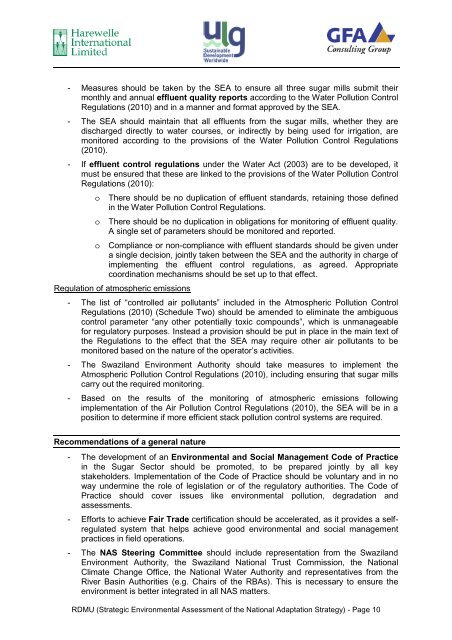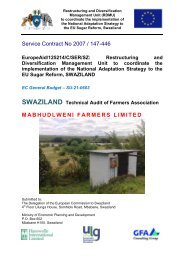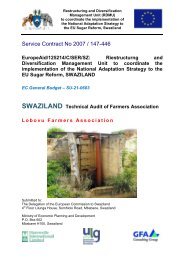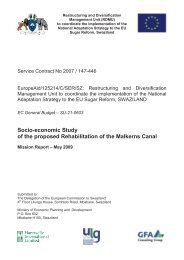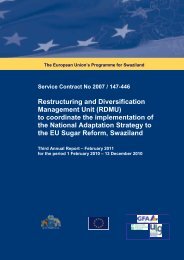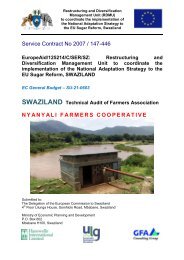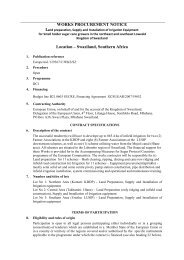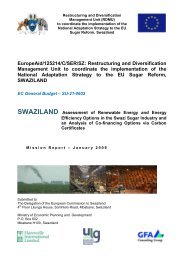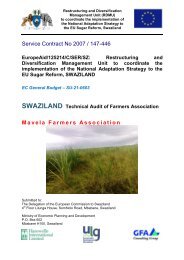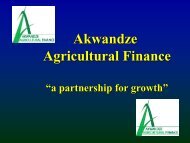Service Contract No 2007 / 147-446 Strategic ... - Swaziland
Service Contract No 2007 / 147-446 Strategic ... - Swaziland
Service Contract No 2007 / 147-446 Strategic ... - Swaziland
- No tags were found...
You also want an ePaper? Increase the reach of your titles
YUMPU automatically turns print PDFs into web optimized ePapers that Google loves.
- Measures should be taken by the SEA to ensure all three sugar mills submit theirmonthly and annual effluent quality reports according to the Water Pollution ControlRegulations (2010) and in a manner and format approved by the SEA.- The SEA should maintain that all effluents from the sugar mills, whether they aredischarged directly to water courses, or indirectly by being used for irrigation, aremonitored according to the provisions of the Water Pollution Control Regulations(2010).- If effluent control regulations under the Water Act (2003) are to be developed, itmust be ensured that these are linked to the provisions of the Water Pollution ControlRegulations (2010):oooThere should be no duplication of effluent standards, retaining those definedin the Water Pollution Control Regulations.There should be no duplication in obligations for monitoring of effluent quality.A single set of parameters should be monitored and reported.Compliance or non-compliance with effluent standards should be given undera single decision, jointly taken between the SEA and the authority in charge ofimplementing the effluent control regulations, as agreed. Appropriatecoordination mechanisms should be set up to that effect.Regulation of atmospheric emissions- The list of “controlled air pollutants” included in the Atmospheric Pollution ControlRegulations (2010) (Schedule Two) should be amended to eliminate the ambiguouscontrol parameter “any other potentially toxic compounds”, which is unmanageablefor regulatory purposes. Instead a provision should be put in place in the main text ofthe Regulations to the effect that the SEA may require other air pollutants to bemonitored based on the nature of the operator’s activities.- The <strong>Swaziland</strong> Environment Authority should take measures to implement theAtmospheric Pollution Control Regulations (2010), including ensuring that sugar millscarry out the required monitoring.- Based on the results of the monitoring of atmospheric emissions followingimplementation of the Air Pollution Control Regulations (2010), the SEA will be in aposition to determine if more efficient stack pollution control systems are required.Recommendations of a general nature- The development of an Environmental and Social Management Code of Practicein the Sugar Sector should be promoted, to be prepared jointly by all keystakeholders. Implementation of the Code of Practice should be voluntary and in noway undermine the role of legislation or of the regulatory authorities. The Code ofPractice should cover issues like environmental pollution, degradation andassessments.- Efforts to achieve Fair Trade certification should be accelerated, as it provides a selfregulatedsystem that helps achieve good environmental and social managementpractices in field operations.- The NAS Steering Committee should include representation from the <strong>Swaziland</strong>Environment Authority, the <strong>Swaziland</strong> National Trust Commission, the NationalClimate Change Office, the National Water Authority and representatives from theRiver Basin Authorities (e.g. Chairs of the RBAs). This is necessary to ensure theenvironment is better integrated in all NAS matters.RDMU (<strong>Strategic</strong> Environmental Assessment of the National Adaptation Strategy) - Page 10


